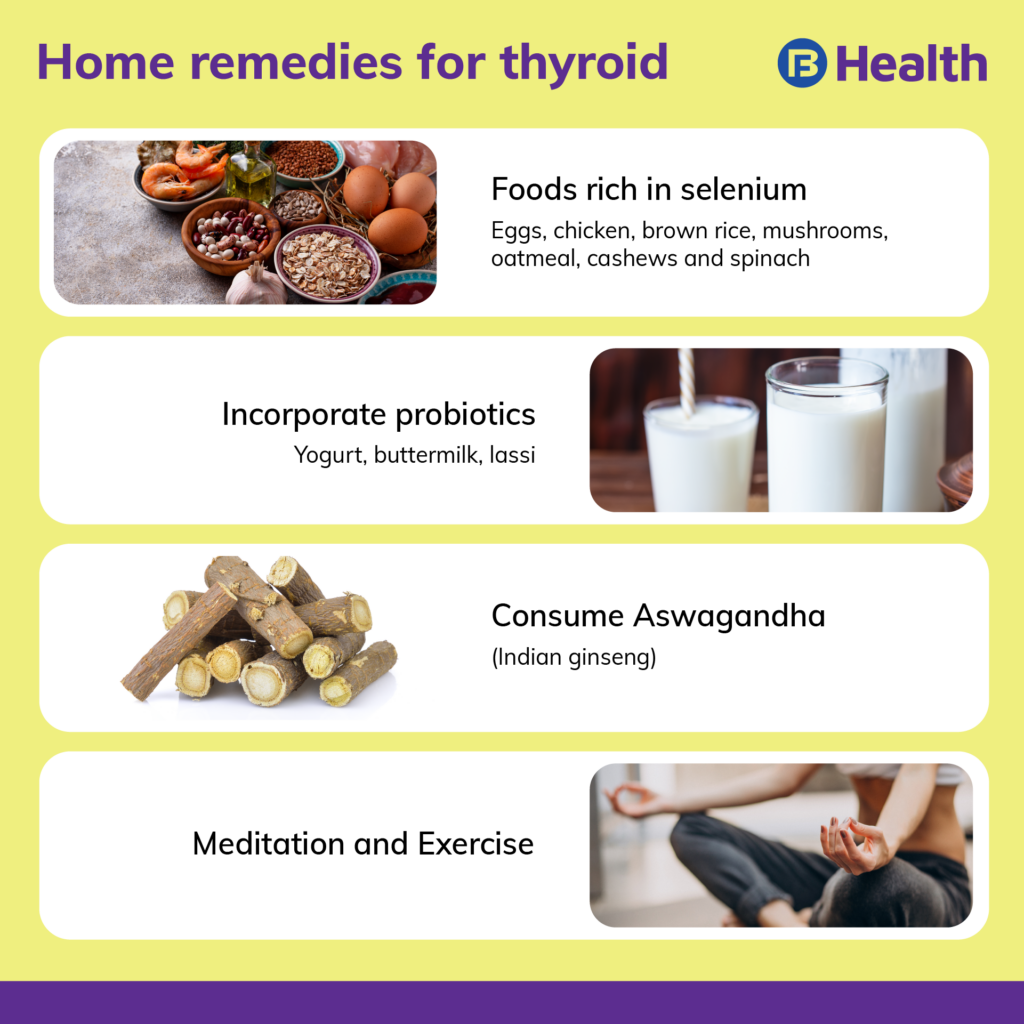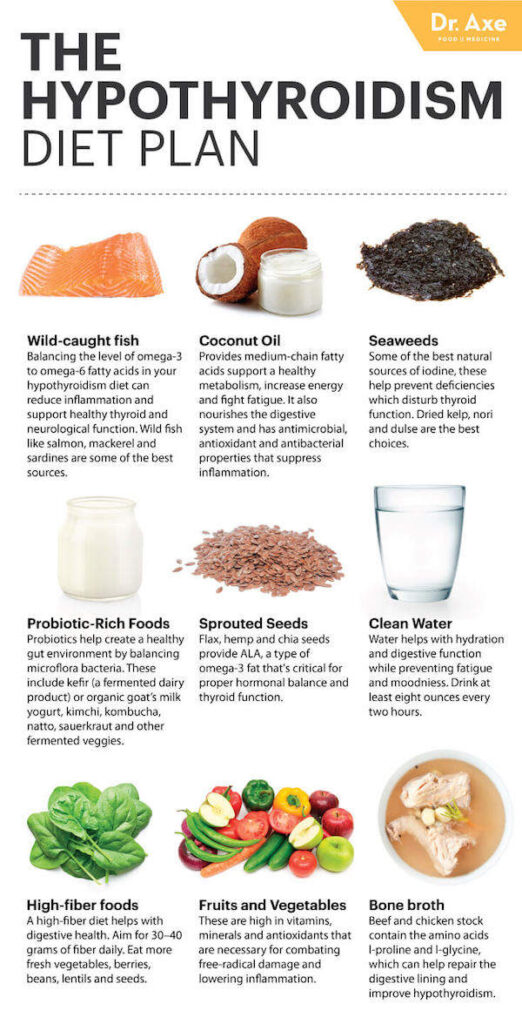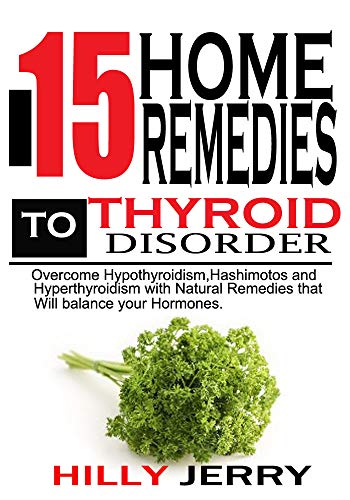Are you tired of dealing with the symptoms of thyroid disorders? Look no further – we’ve got the solution you’ve been searching for. In this article, we will unveil the power of natural remedies in managing thyroid disorders. Say goodbye to the endless cycle of medications and hello to a holistic approach that will restore balance to your body. Whether you’re struggling with hypothyroidism or hyperthyroidism, this natural remedy has the potential to transform your life. Get ready to take control of your health and embark on a journey towards a healthier thyroid.

Understanding Thyroid Disorders
Overview of the Thyroid Gland
The thyroid gland is a small, butterfly-shaped organ located in the front of your neck. It plays a vital role in regulating your body’s metabolism, energy production, and growth. The thyroid produces hormones, namely thyroxine (T4) and triiodothyronine (T3), which are responsible for maintaining the balance of various bodily functions.
Types of Thyroid Disorders
Thyroid disorders can range from mild to severe, and they can affect people of all ages. The most common types of thyroid disorders include hypothyroidism, hyperthyroidism, and thyroid nodules.
Hypothyroidism occurs when the thyroid gland does not produce enough hormones, leading to symptoms such as fatigue, weight gain, and cold intolerance. On the other hand, hyperthyroidism is characterized by an overactive thyroid gland, resulting in symptoms like rapid heartbeat, weight loss, and anxiety. Thyroid nodules, which are abnormal growths on the thyroid gland, can be benign or cancerous.
Causes of Thyroid Disorders
Thyroid disorders can have various causes. In the case of hypothyroidism, it is often caused by an autoimmune condition called Hashimoto’s thyroiditis. This occurs when the body’s immune system mistakenly attacks the thyroid gland. Hyperthyroidism, on the other hand, is commonly caused by an autoimmune condition called Graves’ disease, where the immune system stimulates the thyroid gland to produce excessive hormones.
Other factors that can contribute to thyroid disorders include iodine deficiency, certain medications, radiation exposure, and family history of thyroid conditions. It is important to identify the underlying cause of your thyroid disorder in order to determine the most appropriate treatment options.
Symptoms of Thyroid Disorders
The symptoms of thyroid disorders can vary depending on the specific condition and its severity. For hypothyroidism, common symptoms include fatigue, weight gain, dry skin, hair loss, and depression. Hyperthyroidism, on the other hand, may present with symptoms such as irritability, anxiety, rapid heartbeat, weight loss, and heat intolerance.
Thyroid nodules may not cause any noticeable symptoms in some cases. However, larger nodules can lead to a visible swelling or lump in the neck, difficulty swallowing, or changes in voice. It is important to be aware of these symptoms and seek medical attention if you experience any of them.
Diagnosing Thyroid Disorders
To diagnose thyroid disorders, your healthcare professional may perform various tests. These may include a physical examination, blood tests to measure the levels of thyroid hormones, and imaging tests such as ultrasound or a thyroid scan.
It is essential to consult with a healthcare professional for an accurate diagnosis and appropriate treatment plan. They will be able to determine the underlying cause of your thyroid disorder and recommend the most suitable treatment options for you.
Conventional Treatment Options
Medications for Thyroid Disorders
Medications are commonly prescribed to manage thyroid disorders. For hypothyroidism, synthetic thyroid hormones such as levothyroxine are often prescribed to supplement the deficient thyroid hormones. This can help alleviate symptoms and restore hormone balance in the body.
In cases of hyperthyroidism, medications like antithyroid drugs or beta-blockers may be prescribed to reduce the production and effects of thyroid hormones. These medications can help control symptoms and normalize thyroid function.
Surgical Interventions
In some cases, surgical interventions may be necessary to treat thyroid disorders. For example, surgery may be recommended for thyroid nodules that are suspicious for cancer or causing significant symptoms. Thyroidectomy, the surgical removal of all or part of the thyroid gland, may also be performed to treat hyperthyroidism or certain thyroid cancers.
Radiation Therapy
Radiation therapy is another treatment option for certain thyroid disorders. It involves the use of high-energy rays to destroy thyroid cells and reduce hormone production. Radiation therapy is typically used in cases of hyperthyroidism that do not respond to other treatments, as well as in some cases of thyroid cancer.
It is important to discuss the potential risks, benefits, and side effects of these treatment options with your healthcare professional to make informed decisions about your thyroid care.

Exploring Natural Remedies
Benefits of Natural Remedies
Many people with thyroid disorders are interested in exploring natural remedies as complementary or alternative treatment options. Natural remedies can offer various benefits, such as reducing symptoms, supporting overall thyroid health, and improving well-being. However, it is important to note that natural remedies should not replace conventional medical treatments and should be used under the guidance of a healthcare professional.
Dietary Changes
Making dietary changes can have a positive impact on thyroid health. Consuming a well-balanced diet that includes foods rich in iodine, selenium, and other essential nutrients can support thyroid function. Foods such as seaweed, seafood, Brazil nuts, eggs, and dairy products are good sources of these nutrients.
It may also be beneficial to limit the consumption of processed foods, refined sugars, and caffeine, as they can potentially interfere with thyroid function. Additionally, some individuals may benefit from adopting a gluten-free diet, especially if they have autoimmune-related thyroid disorders.
Herbal Supplements
Certain herbal supplements have been traditionally used to support thyroid health. For example, ashwagandha, an adaptogenic herb, has been studied for its potential to balance thyroid hormone levels and reduce stress. Bladderwrack, a type of seaweed, is a rich source of iodine, which is essential for thyroid function. Lemon balm and bugleweed are herbs that may help regulate thyroid hormone levels.
It is important to consult with a healthcare professional before starting any herbal supplements, as they may interact with medications or have contraindications for certain conditions.
Lifestyle Modifications
Adopting certain lifestyle modifications can also contribute to thyroid health. Managing stress levels, getting adequate sleep, and maintaining a healthy weight are important factors to consider. Chronic stress and lack of sleep can negatively impact thyroid function, so finding effective stress management techniques and prioritizing quality sleep are crucial.
Physical Activity and Exercise
Regular physical activity and exercise can have numerous benefits for overall health, including thyroid health. Engaging in aerobic exercises, strength training, and yoga can help improve metabolism, energy levels, and overall well-being. However, it is important to tailor exercise routines to individual needs and capabilities and consult with a healthcare professional if there are any concerns.
Stress Management Techniques
Stress can exacerbate symptoms of thyroid disorders and impact overall well-being. Therefore, adopting stress management techniques is important for thyroid health. Techniques such as meditation, deep breathing exercises, journaling, and engaging in hobbies or activities that promote relaxation can help reduce stress levels.
Iodine and Selenium Supplementation
Importance of Iodine and Selenium
Iodine and selenium are essential minerals for optimal thyroid function. Iodine is a vital component of thyroid hormones, while selenium is necessary for the conversion of T4 (inactive hormone) to T3 (active hormone). Ensuring adequate levels of iodine and selenium can support thyroid health and prevent deficiencies that may contribute to thyroid disorders.
Food Sources of Iodine and Selenium
There are various food sources that are rich in iodine and selenium. Iodine can be found in seaweed, iodized salt, seafood, dairy products, and eggs. Selenium is present in Brazil nuts, seafood, organ meats, eggs, and whole grains. Including these foods in your diet can help meet your iodine and selenium needs.
Supplementing with Iodine
In cases of iodine deficiency or under the guidance of a healthcare professional, iodine supplements may be recommended. However, it is crucial to consult with a healthcare professional before starting any supplements, as excessive iodine intake can have adverse effects on thyroid health, particularly in individuals with certain thyroid disorders.
Supplementing with Selenium
Supplementing with selenium may be beneficial for individuals with selenium deficiency or certain thyroid disorders. Selenium supplements should be taken under the guidance of a healthcare professional, as excessive selenium intake can be harmful. It is important to discuss the appropriate dosage and duration of supplementation that is suitable for your specific needs.

Herbal Remedies for Thyroid Disorders
Ashwagandha
Ashwagandha, also known as Withania somnifera, is an adaptogenic herb that has been traditionally used in Ayurvedic medicine for its potential health benefits. This herb has been studied for its potential to support thyroid function. Ashwagandha may help balance thyroid hormone levels, reduce stress, and improve overall well-being.
Bladderwrack
Bladderwrack is a type of seaweed that is rich in iodine, which makes it beneficial for thyroid health. It has been traditionally used to support thyroid function and may contribute to hormonal balance. Bladderwrack supplements should be used under the guidance of a healthcare professional to ensure appropriate iodine intake.
Lemon Balm
Lemon balm, also known as Melissa officinalis, is an herb that has calming properties and may help reduce stress and anxiety. While research on its direct effects on thyroid function is limited, lemon balm has been traditionally used for its soothing effects, which can indirectly support thyroid health.
Bugleweed
Bugleweed, also known as Lycopus virginicus, is an herb that has been used in traditional medicine to manage hyperthyroidism symptoms. It may help reduce excessive thyroid hormone production and alleviate symptoms like rapid heartbeat and anxiety. Bugleweed should be used under the guidance of a healthcare professional, especially if you have hypothyroidism.
Motherwort
Motherwort, also known as Leonurus cardiaca, is an herb that has been traditionally used for its potential benefits on heart health and stress reduction. It may have a calming effect on the nervous system, which can help alleviate anxiety and support overall well-being in individuals with thyroid disorders.
Nutritional Supplements for Thyroid Health
Vitamin D
Vitamin D deficiency has been associated with an increased risk of certain thyroid disorders. Ensuring adequate vitamin D levels through sun exposure, fortified foods, or supplements may help support thyroid health.
Vitamin B12
Vitamin B12 is important for various bodily functions, including energy production and nervous system health. It may have a role in supporting thyroid function and overall well-being. Ensuring sufficient vitamin B12 levels through diet or supplements can be beneficial.
Omega-3 Fatty Acids
Omega-3 fatty acids, found in fish oil and certain plant-based sources, have anti-inflammatory properties and may help reduce inflammation associated with certain thyroid disorders. Including omega-3 fatty acids in your diet or taking supplements can contribute to overall thyroid health.
Probiotics
A healthy gut microbiome is essential for overall health, including immune function and digestion. Probiotics, which are beneficial bacteria, can support gut health and potentially have positive effects on thyroid disorders. Including probiotic-rich foods or taking probiotic supplements may be beneficial.
Zinc
Zinc is an essential mineral that supports various bodily functions, including immune system health and hormone production. It may have a role in supporting thyroid function and can be obtained through diet or supplements.

Alternative Therapies for Thyroid Disorders
Acupuncture
Acupuncture, an ancient Chinese medical practice, involves the insertion of thin needles into specific points on the body. It is believed to rebalance the body’s energy flow and promote overall well-being. Acupuncture may be used as a complementary therapy to conventional treatments for thyroid disorders, helping with symptom management and overall health.
Homeopathy
Homeopathy is a system of medicine that uses highly diluted substances to stimulate the body’s natural healing response. Homeopathic remedies are individualized and tailored to the specific symptoms and characteristics of each person. Some individuals may find homeopathic treatments helpful for managing symptoms of thyroid disorders and improving overall well-being.
Ayurveda
Ayurveda, the traditional system of medicine in India, emphasizes a holistic approach to health and well-being. Ayurvedic treatments for thyroid disorders may include dietary modifications, herbal remedies, lifestyle changes, and special detoxification procedures. Ayurvedic practitioners can provide personalized recommendations based on an individual’s specific needs.
Chiropractic Care
Chiropractic care focuses on the alignment and health of the spine and nervous system. Misalignments in the spine, known as subluxations, may affect the nervous system and potentially contribute to various health conditions. Chiropractic adjustments and spinal manipulations may help improve overall well-being, including symptoms related to thyroid disorders.
The Role of Exercise and Yoga
Exercise and Thyroid Function
Regular exercise has numerous benefits for overall health, including thyroid health. Exercise can help improve metabolism, support weight management, and enhance energy levels. Engaging in aerobic exercises, strength training, and other forms of physical activity have been shown to have positive effects on thyroid function.
Yoga Poses for Thyroid Health
Yoga poses can be beneficial for thyroid health, as certain poses stimulate and massage the thyroid gland. These include Sarvangasana (Shoulder Stand), Halasana (Plow Pose), Setu Bandhasana (Bridge Pose), and Matsyasana (Fish Pose). Practicing these poses, along with proper breathing techniques, can help improve circulation to the thyroid gland and support its function.
Breathing Techniques
Practicing specific breathing techniques, such as alternate nostril breathing (Nadi Shodhana) and deep belly breathing, can have a calming effect on the nervous system and help reduce stress levels. These techniques can be incorporated into a regular yoga practice or used independently as a way to manage stress and support thyroid health.

Managing Stress and Sleep
The Impact of Stress on Thyroid Disorders
Stress can have a significant impact on thyroid health. Chronic stress can disrupt the balance of thyroid hormones and contribute to the development or exacerbation of thyroid disorders. Managing stress levels and adopting effective stress reduction techniques are important for supporting thyroid health.
Stress Reduction Techniques
There are various stress reduction techniques that can positively impact thyroid health. These include meditation, deep breathing exercises, progressive muscle relaxation, yoga, mindfulness practices, and engaging in hobbies or activities that promote relaxation. Finding techniques that resonate with you and incorporating them into your daily routine can help manage stress and support overall well-being.
Quality Sleep for Thyroid Health
Sleep plays a crucial role in maintaining overall health, including thyroid health. Lack of quality sleep can disrupt hormone levels, impair immune function, and affect energy levels. Adopting healthy sleep habits, such as maintaining a consistent sleep schedule, creating a relaxing sleep environment, and practicing good sleep hygiene, can contribute to optimal thyroid health.
Consulting with a Healthcare Professional
Importance of Medical Guidance
While natural remedies and alternative therapies can be beneficial for thyroid health, it is important to consult with a healthcare professional before initiating any new treatments or interventions. A healthcare professional can provide personalized guidance based on your specific condition, medical history, and individual needs.
Finding a Qualified Practitioner
When seeking natural remedies or alternative therapies, it is important to find qualified practitioners who have experience and expertise in treating thyroid disorders. This may include naturopathic doctors, functional medicine practitioners, integrative medicine physicians, or healthcare professionals who specialize in herbal medicine, acupuncture, homeopathy, Ayurveda, or chiropractic care. Researching their qualifications, credentials, and experience can help ensure that you receive safe and effective care.
Communication and Collaboration
Maintaining open communication with your healthcare professional is crucial in managing thyroid disorders. It is important to inform them about any natural remedies, supplements, or alternative therapies you are considering or currently using. Collaborating with your healthcare professional allows for a comprehensive and integrated approach to your thyroid health, where conventional treatments and natural remedies can work together synergistically.
Related terms About Natural Remedy For Thyroid Disorders.
Natural Cures For Thyroid Problems In Dogs, Natural Food To Help Thyroid, Natural Remedies For Thyroid Gland In Dogs, Natural Treatment For Underactive Thyroid In Dogs